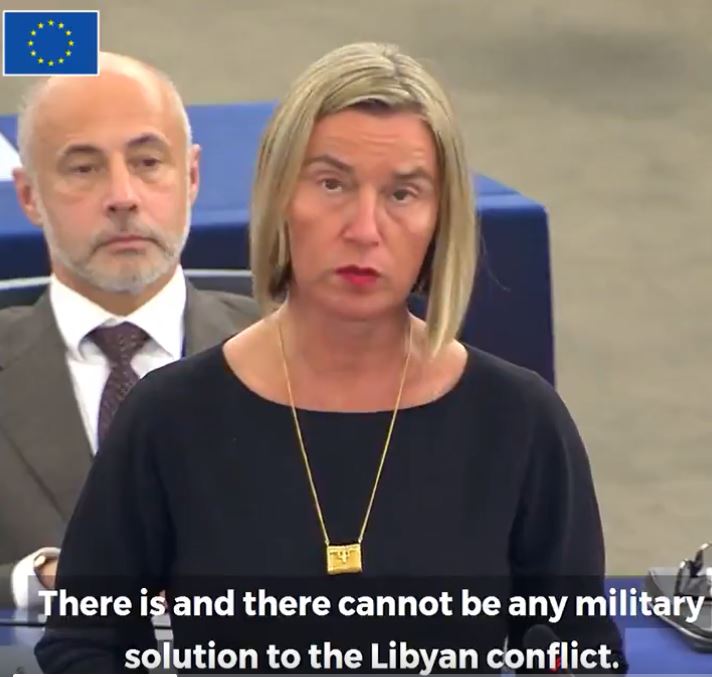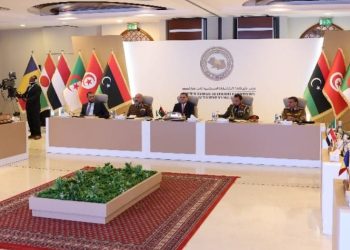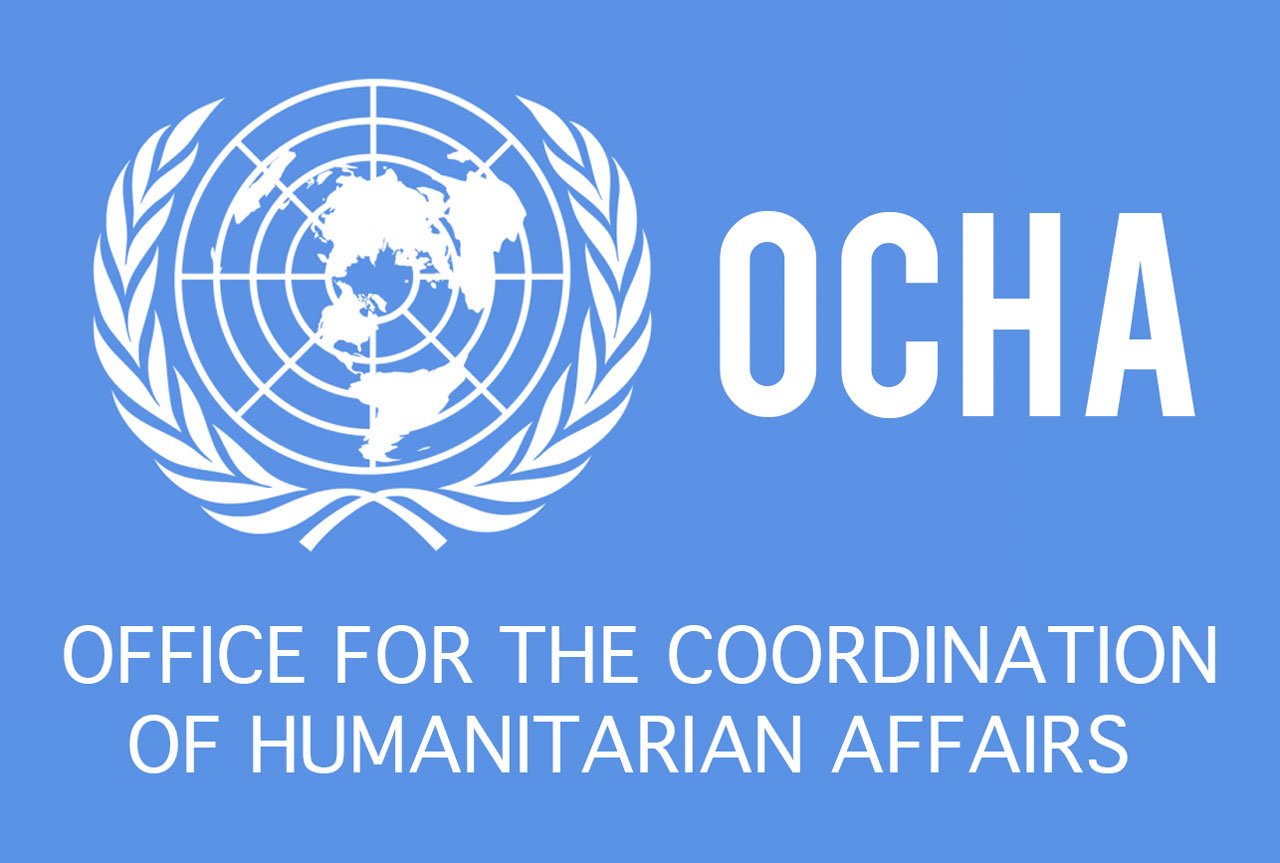By Sami Zaptia.

London, 17 April 2019:
The EU’s High Representative Federica Mogherini called for an immediate ceasefire in the Tripoli fighting and reiterated that there can be no military solution to the Libyan crisis. She said there should be a return to dialogue through the UNSMIL-facilitated National Conference:
He was speaking yesterday at the plenary session of the European Parliament on the situation in Libya.
Mogherini said the National Conference still represents the hope of an entire country and that the offensive against Tripoli has been and is still ‘‘an attack against hope, an attack against the concrete perspective of achieving peace in Libya’’. She called for humanitarian corridors to be opened urgently and for the full respect of humanitarian international law.
Here is her full speech:
‘‘The recent escalation in Libya started at a moment just when the possibility for peace was becoming real. The LNA [Libyan National Army], led by General [Khalifa] Haftar, attacked Tripoli at the very time when UN Secretary-General [Antonio] Guterres was visiting the country, and on the eve of the National Conference, a Conference that still has the potential to represent a new beginning for Libya.
The European Union has worked for almost one year, very closely together with the United Nations and the [UN] Special Envoy [Ghassan Salamé], to prepare the ground for a Libyan led and Libyan owned National Conference that would prepare the ground for elections under the appropriate legal and constitutional conditions.
We have seen, day by day, the aspiration, the readiness, and the desire of all the Libyan people – the citizens of Libya – to move their country forward, to turn the page, to unite and build unity and peace. A country that has potentially an enormous capacity to move forward and a lot of resources and of potential.
The National Conference still represents the hope of an entire country. Just a few days before that military escalation took place, I was myself together with [Antonio] Guterres, with the Secretary General of the League of Arab States [Abu Gheit], with the Chairperson of the African Union [Commission, Moussa Faki] and Ghassan Salamé, the UN Special Envoy, in Tunis in the margins of the League of Arab States Summit, reaffirming the unity of the international community to support this Libyan led, Libyan owned political process that would have helped turning the page and uniting the country in peace.
The offensive against Tripoli has been and is still an attack against hope, an attack against the concrete perspective of achieving peace in Libya.
We have seen this happening before: When peace becomes a real possibility, concrete, possible, it is also when the resistance against peace gets stronger and more evident.
Now we are facing a protracted conflict, with victims in high numbers – including civilians – and a stalemate on the ground. A situation on the ground that is blocked in terms of the line of the conflict but still very active in terms of clashes with the use of arms that we should not be seen used in Libya.
This confirms what we have always known in Europe and in the international community, at least in the recent years: there is and there cannot be any military solution to the Libyan conflict. If the war continues, it will only lead to greater suffering. If someone continues to seek military victory, everybody will lose.
The only scenario where the whole country, where all Libyans, in an inclusive and unified manner moves forward, is a negotiated political solution. If the Libyan parties will not seek a win-win solution, that the international community starting from the European Union would be ready to accompany and support, than all the people of Libya will continue to suffer and the entire region will continue to suffer.
I just spoke again, today, with the UN Special Envoy Ghassan Salamé. Our work is joined and the European Union supports his work on a daily basis. Our support to his work is – I would say – is even stronger today than it has ever been in the past, along three main lines on which the European Union and our Member States have acted united in these last weeks:
First, to affirm the need to open humanitarian corridors as a matter of urgency, and fully respect humanitarian international law.
Second, to establish an immediate ceasefire that I am sure the UN are ready to negotiate.
Third, to go back to the political track, with the holding of the National Conference as soon as possible to give Libyans, the Libyan people – men and women of all generations, of all cities and of the countryside of the country – the chance to outline the common way forward.
These are the three elements on which I am sure, for sure the European Union, for sure the United Nations, but I am also sure the rest of the international community will be ready to support and accompany the Libyan people.
Let me add that not only Libyans and not only the region are suffering. Refugees and migrants trapped in detention centres are also at risk. We are working with the IOM [International Organisation for Migration] and with the UNHCR [UN Refugees Agency] to evacuate them outside Libya, or to move them to safer places inside Libya.
The most recent flight that brought back home safely and voluntary tens of migrants left Tripoli just a few days ago. Our work with the UN agencies continues, but obviously, conditions on the ground are more and more difficult by the day.
This is also why we call on all parties to allow the swift and unconditional evacuation of the detention centres on the front line, as also requested by High Commissioner [Filippo] Grandi last week.
The work we have done together with the UN agencies with the help of the African Union and the Libyan authorities on the ground has brought enormous results in this last year with tens of thousands migrants voluntarily and safely repatriated through the work of the IOM, and those in need of international protection, protected through the UNHCR channels.
The conflict in Libya and the escalation from the military perspective – I know that some in Europe perceive it as a growing threat of growing flows. But first and foremost, it also represents a threat to the lives of those migrants and refugees that are trapped in Libya, whose life is more at risk than others, and for which with the UN agencies, we have been trying to work to try and save lives, and to try and empty the detention centres. The military offensive is also making this work more difficult.
To conclude, let me restate very clear that a swift return to the negotiating table is essential and still possible. We believe, more than ever, that the UN track and the National Conference are the only real opportunity for a peaceful resolution. The multiplication or proliferation of different initiatives may lead to distractions that definitely would not be helpful in this moment.
Humanitarian corridors and respect for the humanitarian international law, ceasefire negotiated by the UN and return to the negotiating table and the holding of the National Conference with the full participation of the Libyan people.
I would like to add that when I say Libyan people, I refer to Libyan men and women. Let me spend one word for praising the Libyan women that sometimes have been in the shadow, trying to accompany the political process so far, in difficult conditions. I believe that the European Union together with the United Nations have an interest, as in any conflict we face, to promote the role of women at the negotiating table, and in the reconciliation process on the ground.
This is what we are trying to contribute to achieve, to support the UN work, try to unite the Europeans. If in the past, we have seen different approaches, I believe today, all European Union Member States understand that our common work is required to avoid Libyans to turn in different directions and disaggregate the potential of unity through a political dialogue that is in their hands.
We have stated clearly last time last week the European Union united position on all these lines in the name of all the 28 Member States. I would now appeal to all regional and international players to unite in support of the United Nations work, of the political perspective for dialogue and unity in Libya, to avoid stakeholders themselves find external reasons for disuniting even further.
On the EU side, I can say that today, they find common, united front in support of the United Nations efforts to bring the parties around the table and define a common perspective for Libya in peace and security.’’








